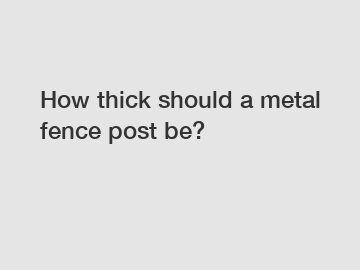Apr. 06, 2024
When it comes to installing a metal fence, one of the most important factors to consider is the thickness of the fence post. The thickness of the post will ultimately determine the overall strength and durability of your fence, as well as its ability to withstand the elements and other environmental factors. But how thick should a metal fence post be? Let's dive in and explore this crucial question in more detail.
Metal fence posts are typically available in a range of thicknesses, with common options including 14-gauge, 16-gauge, and 18-gauge posts. The lower the gauge number, the thicker the metal will be. In general, thicker posts are recommended for taller fences or fences that will be subjected to higher levels of stress or environmental factors.
For most residential applications, a 16-gauge metal fence post should suffice. This thickness is considered a good balance between strength and cost-effectiveness, making it a popular choice for homeowners looking to install a durable and reliable fence. However, if you live in an area with high winds or heavy snowfall, you may want to opt for a thicker 14-gauge post to ensure that your fence can withstand these challenging conditions.

In addition to considering the gauge of the metal post, it's also important to think about the height of your fence and the spacing between posts. Taller fences will naturally require thicker posts to support the weight of the panels and withstand any additional stress from wind or other environmental factors. As a general rule of thumb, for a 6-foot tall fence, you should aim for posts that are at least 2.5 inches in diameter and 16-gauge thickness.
Spacing between posts is another important factor to consider when determining the thickness of your metal fence posts. The further apart your posts are, the more stress each post will have to bear. As such, if you are installing a fence with wider spacing between posts, you may want to opt for thicker gauge posts to ensure that your fence remains sturdy and secure.
Of course, the specific requirements for your fence will depend on a variety of factors, including the type of fence you are installing, the terrain of your property, and your local climate conditions. If you're unsure about the appropriate thickness for your metal fence posts, it's always best to consult with a professional fence installer who can provide guidance based on their expertise and experience.
When it comes to selecting the right thickness for your metal fence posts, it's important to strike a balance between strength and cost. While thicker posts will generally provide greater durability and resilience, they can also be more expensive and may not be necessary for all applications. Ultimately, the best thickness for your metal fence posts will depend on the specific requirements of your project and your budget constraints.
In conclusion, the thickness of your metal fence posts plays a crucial role in determining the strength, durability, and overall quality of your fence. By considering factors such as the height of your fence, the spacing between posts, and your local climate conditions, you can select the appropriate gauge for your metal posts to ensure a sturdy and reliable fence that will stand the test of time. Remember, when in doubt, it's always best to consult with a professional fence installer who can provide expert advice and guidance based on their experience and expertise.
Are you interested in learning more about y star picket post service, Studded T Post 0.85lbs/ft, Step-in Post? Contact us today to secure an expert consultation!
Previous: Weathering the Storm: Advantages of Materials for Outdoor ...
Next: What are step in posts?
If you are interested in sending in a Guest Blogger Submission,welcome to write for us!
All Comments ( 0 )